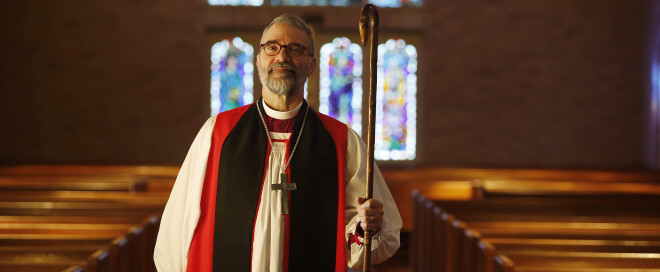Feast of the Benedict of Nursia
Dear Brothers and Sisters,
Greetings in Christ. General Convention 2018 is now over, and so I want to explain to you what has happened, and what it means for our common life. I am grateful for all who have been praying for us during these demanding two weeks of deliberation, as well as for the remarkable EDOD deputation. I have previously laid out the theological framework within which these decisions can be understood in my extended pastoral letter. For a theological perspective on what has happened, shared by all the Communion Partner bishops, please do read our Austin Statement. (This letter was originally intended for the clergy, but you are reading an amended version for laity as well.)
First and most importantly, the General Convention has decided not to amend or alter the Book of Common Prayer, for which I am deeply grateful. This reaffirms the tradition of faith of which we are grateful recipients, and it avoids the greatest damage to our relations with our fellow Anglicans in the Communion. Secondly, the mandate for future liturgical reform included an enduring status for the 1979 Prayer Book. Thirdly, the General Convention has also set up an important Communion Across Difference Taskforce, made up equally of traditionalists and progressives, to think about our future. This is also a positive development.
However, the Convention has also removed the right given to diocesan bishops at General Convention 2015 to grant or withhold permission for the use of the rites of same-sex marriage in their dioceses (whose reauthorization of the same sex rites I voted against). This new state of affairs goes into effect on the first Sunday of Advent, December 2. I should hasten to add that the Convention reaffirmed both the honoring of conscience of clergy who cannot preside at a same sex marriage, as well as the canonical right of a rector to have control over the liturgical life within his or her church building.
I have instructed and informed the clergy to continue in both the traditional teaching of the church catholic and the inherited practice of marriage, so as to remain in full solidarity with my teaching and ministry as bishop. Their relationship to me is special, since they have taken a vow to obey their bishop.
I am, however, no longer able to stop parishes, who wish to, from using these rites. We are, and will remain, a part of our national Church, which has made this decision, so we must find a way to live within its bounds. Now the rites mentioned in Resolution B012 are for trial use, so they are to be used "under the direction of the bishop." According to the resolution, the rector is the one who may request access, but he or she should consult with me about the process most appropriate for his or her parish. I do think that vestry concurrence with the rector's request is a wise step.
Rectors wishing to receive access to these rites by the first Sunday of Advent, when the resolution goes into effect, will need to contact me by August 15. Obviously, rectors could make this request at any time subsequently.
This question does not apply to missions, for whom I am in effect the rector, and from whom I will continue to withhold my permission.
We will endeavor to see that same sex couples wishing to be married, who are not members of one of these parishes, are pastorally committed into the care of the visiting bishop so that, if they wish, one of the rectors of the parishes he will oversee may provide them the rite.
Since I am not able by conscience and conviction to oversee a parish using these rites, since a bishop and his or her doctrinal teaching cannot be separated, we will need to work out oversight for the parish’s pastoral life, confirmation, discipline, etc. Let me emphasize that this referral will not because of any anger, breakdown of pastoral relation, or rejection- it is because of a deep difference in theology. These parishes will remain part of the Diocese of Dallas in all things temporal; they will lose none of their privileges of voting, nor the obligation of their assessment. I am in conversation with a bishop colleague about helping us in this way (and at some point, I may offer such help to traditional parishes in another diocese).
These parishes will remain daily in my prayers, and I am confident that our ties of friendship will remain as well. Such oversight will serve to honor both my own conscience and conviction and those of the parishes involved, and I am very hopeful that we can work all this out without rancor.
So, the pledge I made in the extended pastoral letter stands: the parishes under my pastoral oversight will remain with their traditional theology and liturgy unchanged. I will in the coming months work to preserve as much of our relation to the churches of the Anglican Communion as a "Communion Partner Diocese" as best I can.
Learning from the wise course of my predecessor, I will be visiting each parish vestry or bishop's council this summer and fall to discuss all these matters in person and at length.
I know that many theological conservatives are again dismayed by the results of Convention, and some progressives may be disappointed. But amidst these feelings, here is another way to understand this moment. It is time for peace, for the Truce of God. It is time to end the generation-long campaign around this issue, and with it the sense that those holding the traditional view are opponents of justice. With the support of the Presiding Bishop, we have as a Church decided to find a way forward for both parts of our Church. This will not be an easy adjustment. May we no longer view each impending General Convention with trepidation. Instead may we turn to the work of evangelism and formation God is giving us now to do.
"Sufficient unto the day is the trouble therein." This is enough new liturgical information for one occasion. Some new supplemental liturgies were approved with which I do not agree, but I will explain these in detail soon.
Let me close with a word of encouragement. Jesus is "the same yesterday, today, and forever." (Hebrews 13:8) The call to evangelize is unchanged. The vocation of our diocese is unchanged. Our Prayer Book is unchanged. In these times of shifting post-modern sand, our house is built on rock. Please pray for us all and maintain relations of charity among all your fellow Episcopalians.
Peace,
The Rt. Rev. George R. Sumner
Bishop of Dallas
+GRS



